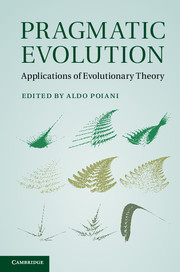Book contents
Preface
Published online by Cambridge University Press: 05 April 2012
Summary
Preface
When scientists refer to Evolution they often do so by also adding the word ‘theory’. This may give the impression that the Theory of Evolution is ‘just a theory’. Obviously, it is not. It is, in fact, the best scientifically corroborated view of life that we currently have; there is no other credible alternative that succeeds equally well at explaining the known facts of life after the strict criteria of the scientific method are used to sieve through the available contenders. Aerodynamics is also a theory – applied to aircraft design – but, consciously or unconsciously, we do not regard it as ‘just a theory’ each time we board an aeroplane. As with mathematics, theoretical physics and chemistry, if evolutionary science provides a sound description of reality, then such knowledge could be applied for the benefit of all. In this book, a team of leading specialists in various disciplines ranging from palaeontology, genetics, ecology, agriculture, fisheries, medicine, neurobiology, psychology and animal behaviour to information technology, education, anthropology and philosophy come together to explore the many and very diverse applications of evolutionary thinking. The result is a smorgasbord of examples and very many ideas that I hope will excite the imagination of the reader. Evolutionary approaches may be especially useful whenever we want to find solutions to problems that are associated with complex systems, solutions that take advantage of the evolved capabilities of organisms. Such an approach may succeed where more reductionistic strategies have failed. On the other hand, some multi-organismal entities (such as populations, communities, ecosystems) and also individual organisms may contain modular aspects that could facilitate more reductionistic approaches to problem-solving in specific cases. For instance, highly specialised molecules could be manipulated in order to solve a specific problem without great fear of unexpected side-effects. A very different approach is required for molecules that have many effects across different aspects of the physiology of the organism. A better understanding of the evolved reality of the system that is the focus of our attention will help us harness such a reality to produce the outcomes that we want to achieve, whilst minimising time spent, costs, side-effects and maximising sustainability of the solution. These basic principles are specifically illustrated in the various chapters. I invite the readers to use this book not only as a source of information to better understand contemporary evolutionary science and its applications, but, above all, as a source of inspiration to explore new possibilities for constructive evolutionary applications across many fields.
- Type
- Chapter
- Information
- Pragmatic EvolutionApplications of Evolutionary Theory, pp. xxi - xxiiPublisher: Cambridge University PressPrint publication year: 2011

